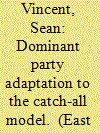|
|
|
Sort Order |
|
|
|
Items / Page
|
|
|
|
|
|
|
| Srl | Item |
| 1 |
ID:
156253


|
|
|
|
|
| Summary/Abstract |
In the process of democratisation, it is expected that a former dominant party, at least one which abides by the rules of electoral contestation, will transition into a “catch-all” party. A catch-all party aims to attract the votes of all social cleavages and classes of voters outside what would be considered their traditional voter base. As part of the wider debate about democratisation in East Asia, this paper examines how two of East Asia’s liberal democracies—Japan and South Korea, the LDP and GNP/Saenuri, respectively, have adapted to electoral defeat and in what ways they have transitioned into catch-all parties in the Kircheimer mould. This paper finds that while intra-party reforms which could fit a catch-all model have yet to be institutionalised, data from the Comparative Manifesto Database shows that there has been a significant change in which policies both parties promote and that these are designed to appeal to a broad base of voters.
|
|
|
|
|
|
|
|
|
|
|
|
|
|
|
|
| 2 |
ID:
156252


|
|
|
|
|
| Summary/Abstract |
This study has focused on the organizational and structural aspects of Nippon Kaigi, a major rightist lobbying group in Japan. It argues that Nippon Kaigi may not be that powerful despite the group’s influential outlook. By examining the elements of the organization and their relationships with each other, this study observes that Nippon Kaigi as a whole may not be very cohesive.
|
|
|
|
|
|
|
|
|
|
|
|
|
|
|
|
| 3 |
ID:
156251


|
|
|
|
|
| Summary/Abstract |
After North Korea conducted its fourth nuclear test in January 2016, China’s response was stern enough for certain China analysts to posit that the Middle Kingdom’s approach to its Cold War ally was changing. In reality, however, China’s imports from North Korea, especially coal, a crucial mineral for the North’s income but banned by United Nations (UN) Resolution 2270, did not decrease. Politically, China also strived to maintain mutual relations with North Korea. Based on its strategic and other cost-benefit calculations, Beijing needs to maintain economic and political ties with Pyongyang and thus has no incentive to seriously observe the U.N. resolution. In this context, China is expected to virtually repeat the gestures it made in the past in dealing with the North. Under these circumstances, sanctioning North Korea through China is not considered a viable option in tackling the nuclear issue; rather, the USA and South Korea should change their policy approach toward this problem.
|
|
|
|
|
|
|
|
|
|
|
|
|
|
|
|
| 4 |
ID:
156254


|
|
|
|
|
| Summary/Abstract |
Nation building is a major issue in the political agenda of many countries, a project made more arduous in countries fragmented along racial, linguistic, and religious lines. In an attempt to gain some understanding of the issue, this paper examines the trajectory of nation building in Malaysia. Basically, the Malaysia government uses the model of nation-state to create a sense of collective national identity in a multi-ethnic society. It is a top-down approach with the state playing a dominating role. The main political parties are communal parties, based on race or religion. Well-crafted programs of nation building have been not properly implemented. While the government has achieved impressive economic development, it is at the same time becoming more authoritarian and the country faces a range of disturbing social and political problems. Thanks to a growing educated middle class, urbanization, demographic change, globalization, and the spread of the Internet, mass-based civil movements and a multi-ethnic coalition of opposition parties have emerged with the potential of redressing the situation. The study suggests a framework for understanding the trajectory and dynamics of the nation-building project in Malaysia. The framework gives a list of historical forces that are likely to shape the course of nation building in the coming years.
|
|
|
|
|
|
|
|
|
|
|
|
|
|
|
|
|
|
|
|
|